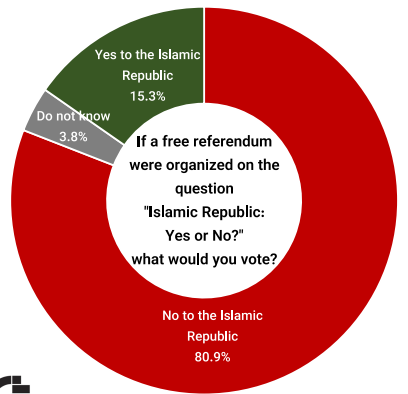February 17, 2023
A new poll by the Netherlands-based GAMAAN polling agency finds that only 15 percent of Iran’s population currently supports the regime, with support at 20 percent among those 50 and older but at only 9 percent among the those under 30 years of age.
There was no significant difference between those with a university education and those without (less than 1 percentage point), and surprisingly little difference among genders18 percent support among males and 13 percent support among women. Twenty percent of rural residents supported the regime versus 14 percent of urban residents.
The poll asked, “If a free referendum were organized on the question, ‘Islamic Republic: Yes or No?’ How would you vote?” GAMAAN said 81 percent answered no while 15 percent answered yes and 4 percent said they did not know.
The poll also asked what respondents preferred as an alternative to the Islamic Republic. This showed remarkable support for re-establishing a constitutional monarchy. Of those polled, 29 percent said they preferred a presidential republic (like the US), 12 percent said they preferred a parliamentary republic (like most European countries) and 22 percent preferred a constitutional monarchy. Another 5 percent volunteered other options, while 17 percent stated no preference.
The poll was taken in late December by the Group for Analyzing and Measuring Attitudes in Iran (GAMAAN), a long established polling organization based in the Netherlands and operated by Iranian expatriate academics teaching in the Netherlands. The poll surveyed 158,000 people living in Iran, a huge number for a poll. Political polls in the United States rarely even reach 5,000 people.
The survey asked about the attitude toward the Iranian national soccer team’s loss to the United States in the World Cup, a game played just a few weeks before the poll was taken. It found that 46 percent were “happy” that Iran lost to the US and only half as many, 23 percent, felt “sad” at the loss, with 30 percent lacking any reaction. The poll reflects a common view that the regime seeks to take over events that are Iranian and make them accomplishments instead of the Islamic Republic.
The poll then presented the names of 34 well-known Iranians and asked which ones the respondent would pick to serve on a council that would try to guide Iran to a post-Islamic Republic world. Respondents could choose any number of people. By far the most popular figures for such a council were Reza Pahlavi, son of the late Shah, at 49 percent, and retired soccer stars Ali Daei at 49 percent and Ali Karimi at 45 percent.
There was then a drop to Hamed Esmaeilion, the Iranian-Canadian organizer of the families of those killed in the Pasdar shootdown of the Ukrainian passenger jet, and Hossein Ronaghi, a popular blogger and human rights activist, at 37 percent and 35 percent.
There was then another sharp drop to a group of women: actress Nazanin Boniadi (23 percent); Fatemeh Sepehri, a human rights activist best known for demanding the resignation of the Supreme Leader (23 percent); Masih Alinejad, who first organized the opposition to mandatory hejab (21 percent); human rights lawyer Nasrin Sotoudeh (20 percent); male hip hop singer Toomaj Salehi (19 percent); and human rights lawyer Narges Mohammadi (18 percent).
Some of the other figures further down the list were: Nobel laureate Shirin Ebadi (13 percent); environmentalist Kaveh Madani (12 percent); retired NASA scientist Firouz Naderi (12 percent); former Prime Minister Mir-Hossein Musavi (5 percent); and Mojahedin-e Khalq leader Maryam Rajavi (0.8 percent), who came in last.
The survey asked those who support the protests what they thought the West should do. An overwhelming 73 percent wanted the West to “pressure” the regime. Another 3 percent thought the West should only voice “condemnation” of violence against the protesters, which is largely what the West has done. A further 19 percent said the West should stay out of what is a purely Iranian matter, while the remaining 4 percent had no opinion.
The survey then asked what should happen to officials of the Islamic Republic once the regime topples. A total of 16 percent advocated “revolutionary executions,” meaning summary death without a trial. Another 29 percent advocated execution only if a fair trial imposed that penalty. A total of 24 percent opposed the death penalty but advocated imprisonment. Only 3 percent backed forgiveness and a general amnesty, while 27 percent had no opinion. The survey was conducted online, with most respondents using Instagram or Telegram. But this means the respondents pick themselves and are not representative. The survey then used processes called “matching” and “raking” so that the responses counted lined up with the actual population for women, rural residents, college graduates and the like. For example, 50 percent of those completing the survey said they did not vote in the 2017 presidential election, but the actual non-voting proportion was 29 percent. The results were weighted to reflect that.

